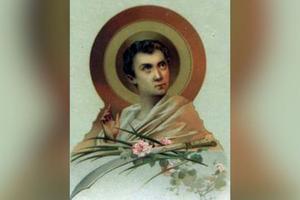Pope Francis: ‘How Many Stephens There Are in the World!’
‘The true history of the Church is that of the saints and the martyrs,’ the Holy Father said at daily Mass on April 21, reflecting on the persecution of Christians.
VATICAN CITY — Amid a torrent of recent news reports on persecuted Christians, Pope Francis reflected on those killed for their faith and said that these modern “Stephens” suffer as the Church's first martyr did.
“The Church today is a Church of martyrs: They suffer; they give their lives, and we receive the blessing of God for their witness,” Francis told attendees of his April 21 Mass, held in the Vatican’s St. Martha guesthouse.
“In these days, how many Stephens there are in the world!” he said, referring to the first apostle who was killed for proclaiming Jesus Christ and is hailed as the Church’s first martyr.
“Let us think of our brothers whose throats were slit on the beach in Libya; let’s think of the young boy who was burnt alive by his companions because he was a Christian,” Francis said. The Pope referred to a 14-year-old Pakistani named Nouman Masih, who passed away April 15 after being set on fire by two unknown men. After inquiring about his religion, the men doused Masih in kerosene and set him alight.
He also brought to mind “those migrants thrown from their boat into the open sea by other migrants because they were Christians; let us think, just the day before yesterday, of those Ethiopians assassinated because they were Christians … and of many others.”
Reports indicate that a disagreement was sparked among passengers on a rubber boat bound for Italy that was carrying 105 people; 15 Muslim passengers threatened to abandon at sea the Christians, who came from Nigeria and Ghana, based on their faith.
After a fight broke out, 12 of the Christians were thrown overboard to their deaths, while others survived the attack by resisting the drowning attempt and forming a human chain. The Italian coast guard has arrested 15 people in association with the attack.
The Pope also called attention to the many Christians suffering silently inside jail cells just because of their faith in Jesus Christ.
Among them is Pakistani Christian Asia Bibi, who in 2010 was convicted of violating Pakistan's strict blasphemy laws, an allegation she denies. Her husband and daughter traveled to Rome last week, where they met with Pope Francis and received his blessing during his Wednesday general audience.
In February, the Islamic State released a video depicting the decapitation of 20 Coptic Christians after they had gone missing near the coastal city of Surt, also known as Sirte, in Libya.
On Sunday, another video was released by social-media accounts associated with ISIS showing the mass executions of Ethiopian Christians in Libya.
In an April 20 message sent to Abuna Matthias, patriarch of the Ethiopian Tewahedo Orthodox Church, Francis offered condolences and said, “It makes no difference whether the victims are Catholic, Copt, Orthodox or Protestant. …Their blood is one and the same in their confession of Christ!”
In his homily Tuesday, Pope Francis said, “The true history of the Church is that of the saints and the martyrs.”
He recalled how Stephen had to deal with false witnesses and the anger of those accusing him.
Stephen, the Pope noted, reminded the elders and scribes how their ancestors had persecuted other prophets, and when he described his vision of the Son of Man standing at the right hand of God, they didn’t want to hear it, so they threw him out of the city and stoned him.
“God’s word is always rejected by some. God’s word is inconvenient when you have a stone heart, when you have a pagan heart,” he said.
Francis noted how the whole history of Revelation is marked by the many martyrs who have been killed “for their faith and loyalty towards God’s word, God’s truth.”
He closed his homily by pointing out that there are also many “hidden martyrs,” who are the faithful men and women who listen to the voice of God and look for new ways to help their brothers and sisters love the Lord.
These people, the Pope said, are often viewed with suspicion, vilified and persecuted by the modern “Sanhedrin” who think they possess the truth.
















